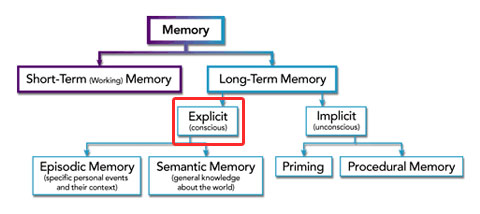One of the two major subcategories of long-term memory is called ‘explicit memory’ also known as ‘declarative memory’ – the other is implicit memory. Conscious thought is required for explicit memory – for example, naming the capital cities of each province or recalling the names of people you met at a party. Most people have ‘explicit memory’ in mind when they think about whether or not they have good ‘memory’. This type of memory is often associative which means your brain links various memories together. For example, if you were to think of a particular word like ‘food’, your memory would bring up a whole slew of associated memories – from recipes, to restaurants you were enjoying visiting, to your last family Thanksgiving dinner, to hundreds of other things.
Episodic Memory
One specific type of explicit memory is called ‘episodic memory’ which is autobiographical – meaning it provides us with essential records of our personal life experiences. Being able to remember the trip we took to Mexico, what we ate for breakfast this morning, and who mentioned to us that our friend Sarah is expecting are all examples of episodic memory at work. Episodic refers to anything we remember about past events where we played and which we remember as a scene of events (‘episode’). Several factors determine how well we are able to record episodic memory. A memory is often stronger when, for example, something happens to us in emotionally charged conditions. Most of us can likely recall where we were when news of the World Trade Center attack occurred on September 11, 2001, or the wedding details for a loved one, because these are both examples of highly emotional moments. Episodic memory seems to be centered within our brain’s hippocampus (with significant assistance from the cerebral cortex).
You can read more about this particular type of autobiographical memory and complete a test to determine if your episodic memories are centered in the same timeframe of life as the average person.
Semantic Memory
Semantic memory is another type of explicit memory. This type of memory accounts for our general knowledge of the world – or our ‘textbook learning’.
Semantic Memory allows us to say that a giraffe has a long neck or that London is a major city in England – without knowing precisely where and when we learned that information. Some scientists say Semantic Memory occurs in the hippocampus and related areas, while others believe it is spread more widely throughout the brain.
Semantic memory, similar to episodic memory, ranges from weak (familiarity) to strong (recall). Semantic memory however is better sustained over time – unlike episodic memory. A highly functioning semantic memory can often be retained well into our 60’s but will then begin a slow decline.







 English
English
 Français
Français


